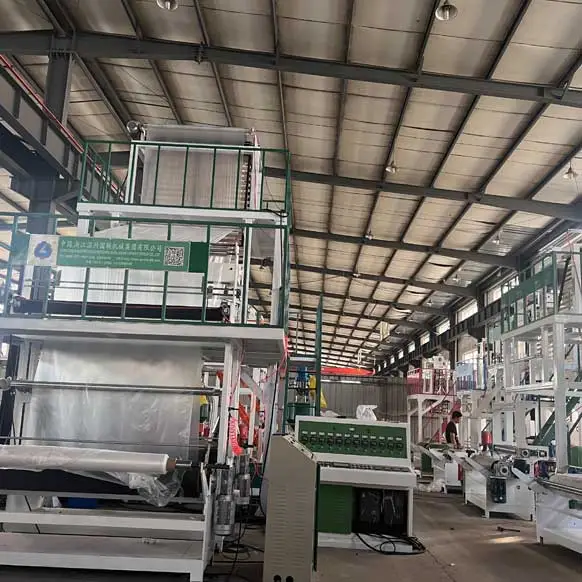
- > Search By Functions
- > Co-Extrusion
- > Search By Material
- > Search By Machines
- > Search By Machines
- > Search By Machines
What are you looking for?
The advancement in technology has led to remarkable innovations in the manufacturing industry. One such invention is the 3-layer blown film extrusion machine, a revolutionary equipment used for producing high-quality plastic films and packaging materials. In this blog, we will explore the fascinating workings of the 3-layer blown film extrusion machine and its significance in modern manufacturing processes.
The 3-layer blown film extrusion machine, exemplified by the renowned Guolian brand, is an intricate apparatus designed to create plastic films with distinct properties and functionalities. It comprises three main layers, each responsible for adding specific characteristics to the film. The reliable construction and efficiency offered by Guolian's machine have made it a sought-after choice among manufacturers worldwide.
The working principle of the 3-layer blown film extrusion machine involves several distinct steps. First, the raw materials, usually in the form of plastic resin pellets, are fed into different hoppers based on their intended layer composition. The machine then accurately measures and feeds the materials into their respective extruders, where they are melted and transformed into a molten state.
Once the plastic materials have melted, they are pushed through individual screw mechanisms, each equipped with a specific design to ensure even mixing and homogeneity. The molten plastic is then conveyed to the die head, deposited as a tubular structure, and extruded vertically upwards, forming the film's core layer.

To achieve the desired three-layer configuration, the 3-layer blown film extrusion machine utilizes a unique mechanism. The molten plastic from the core layer combines with the outer layers, formed from separate extruders, as they pass through a series of nip rolls. These rolling mechanisms facilitate the lamination process and create a well-integrated film with distinct layer characteristics.
The outer layers, often different in composition and color to the core layer, are responsible for imparting various attributes such as strength, barrier properties, or enhanced aesthetics to the final film product. By manipulating the extrusion speed, temperature, and the composition of the raw materials, manufacturers can achieve films with specific properties tailored to their intended applications.
The versatility of the 3-layer blown film extrusion machine has made it a valuable asset in a wide range of industries. From food packaging to pharmaceuticals and agricultural films, this machinery enables the creation of films that meet the highest quality standards.
The benefits offered by the 3-layer blown film extrusion machine are numerous. With its superior layering capabilities, it allows manufacturers to combine the unique properties of various plastic materials, creating films that possess exceptional strength, tear resistance, puncture resistance, and barrier protection. Additionally, the machine's flexibility enables manufacturers to optimize their film production, reducing waste and increasing productivity.
As we explored the working principle of a 3-layer blown film extrusion machine, it became evident how this technology has revolutionized the manufacturing industry. The precise layering process offered by Guolian's machine and its versatility in producing films with specific properties have elevated the standards of quality and performance. With the increasing demand for advanced packaging solutions, the 3-layer blown film extrusion machine will continue to play a vital role in shaping the future of the industry.